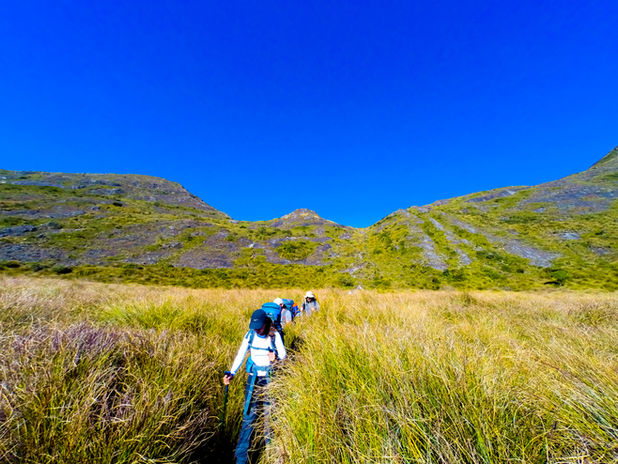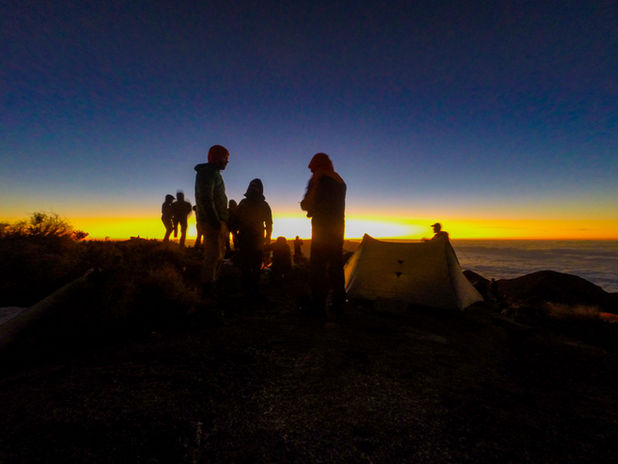



-
Good physical condition
-
Previous mountaineering experience (not mandatory but recommended)
INCLUDED
-
Transfer in/out of the mountain from Passa Quatro
-
1 WFA first aid guide in Portuguese, English and Spanish for every 5 people
-
Breakfast days 1, 2, 3 and 4
-
Dinner on days 1, 2 and 3
-
Kitchen equipment
-
Shit tube for collective use
-
Assistance in purchasing equipment before the trip
-
First aid kit for collective use
-
1 Captain Jack snack
NOT INCLUDED
-
Transportation to Passa Quatro (round trip)
-
Trail food (snacks) extra to the included
-
All camping equipment, including tents (in the alpine style option)
-
Physics: high
-
Technique (climbing): non-existent
-
from R$ 3,390 per person (1st batch promotional price)
-
June 19 to 22, 2025 (Corpus Christi holiday)
-
11 to 14/Sep/2025
-
custom dates on demand
CLOTHING
-
Dryfit T-shirt - 1 to 2 units
To be used while walking. Recommended in POLYAMIDE and with long sleeves for extra protection against solar radiation and scratches from branches.
-
Thin thermal 2nd skin T-shirt - 1 unit
These are very thin and tight-fitting garments that fit snugly against the body. This feature increases heat retention. They will be used to withstand the cold nights at altitude only at camp.
-
Fleece blouse 200 - 1 unit
Fleece is a type of fabric with high heating power, low weight and good compression. If you want to invest in a material that is even lighter and more compressible but much more expensive, choose a goose down jacket. But be careful! There are several types of down jackets, and many are NOT SUITABLE FOR OUTDOOR SPORTS. For more information, contact our team. If you DO NOT want to invest, you can replace it with a regular sweatshirt, but this is highly NOT recommended because it is heavier, bulkier and dries slowly if it gets wet.
-
Fleece blouse 400 - 1 unit
It will only be used at camp, when temperatures can drop to -5ºC in the height of winter.
-
Anorak - 1 unit
This is the most important item in your backpack. It can literally save your life, as it will protect you from hypothermia. It must have a hood, be water-resistant and preferably breathable, that is, allow your sweat to escape without letting rainwater in. IT IS NOT RECOMMENDED but can be replaced by a regular raincoat.
-
Trail pants - 1 to 2 units
-
Waterproof anorak pants (optional depending on the rain forecast) - 1 unit
-
Thin 2nd skin pants - 1 unit
To withstand the cold nights at altitude. It will only be used at camp.
-
Fleece pants 200 - 1 unit
To withstand the cold nights at altitude. It will only be used at camp.
-
Underwear - 2 units
-
Trekking boots - 1 unit
Ideally, it should be specifically designed for mountaineering, with a good sole (ideally Vibram® ), high shaft, water resistant and preferably with a breathable GoreTex® membrane. Some people go hiking with regular sneakers, but THIS IS NOT RECOMMENDED.
-
Thin liner socks - 1 or 2 units
Choose technical socks specifically designed for mountaineering. They should be highly breathable, which helps to keep your feet in contact with moisture from sweat as little as possible, one of the three factors that cause blisters.
-
Thick sock - 1 unit
For use at camp.
-
Crocks or flip flops - 1 pair
For use at camp.
-
Hat - 1 unit
Opt for fleece models.
-
Balaclava (optional) - 1 unit
-
Bandana / expedition cap / hat - 1 unit
Choose a bandana as it is much more versatile and can withstand extreme environmental conditions.
-
Thin liner glove - 1 unit
Choose those made of polyester.
-
Medium windproof glove - 1 unit
CAMPING
-
Tent - 1 unit
For one or two people weighing less than 2.5 kg. We have it available for rental.
-
Sleeping bag 0ºC (comfort) - 1 unit
The "limit" temperatures indicated by all manufacturers are very relative from person to person. The ideal is to always consider only the "comfort temperature". If this is similar to the external temperature of the environment, you will be able to sleep comfortably just by wearing the second skin. We have it available for rent.
-
Thermal insulating mattress - 1 unit
Preferably opt for inflatable or closed cell models. We have them available for rental.
-
Pillow (optional) - 1 unit
Use camping-specific ones, which are smaller and lighter than domestic ones. To avoid this extra weight, you can replace it with a sweater.
ACCESSORIES
-
Cargo backpack 50 to 60L - 1 unit
It is mandatory to have a waist belt and it is highly recommended to have adaptation for hydration bags.
-
Backpack rain cover - 1 unit
-
Headlamp - 1 unit
Having the most open ones, besides being more comfortable, is a safety issue if you have to go through a more technical section with little light. On some routes we make a short attack on the summit in the late afternoon to catch a glimpse of the sunset, and the descent ends up being at night. If you insist on not investing in this item, it can even be replaced by a cell phone flashlight, but IT IS NOT RECOMMENDED.
-
Spare battery pack - 1 unit
Choose lithium batteries, which are more resistant to low temperatures.
-
Sunglasses - 1 unit
An essential item to make your trip more comfortable. Radiation at altitude is greater than at sea level, so protect yourself!
-
Trekking poles (optional) - 1 pair
It says "optional" because many people take a while to get used to using them. The benefit is tremendous: it reduces the impact on your knees by up to 30%. If you use them, avoid those with screw-on or automatic locks. They are less resistant.
-
3L Water Tank with hose - 1 unit
Important item because dehydration at altitude increases the chance of altitude sickness (severe headaches and nausea, for example). This type of system avoids the "taking off and putting on" of the backpack, but can even be replaced by plastic bottles.
-
Waterproof bag 1L (optional) - 1 unit
To protect/organize small items and electronics.
-
8L waterproof bag (optional) - 1 unit
To protect/organize clothes.
-
Pee bottle (optional) - 1 unit
It may seem silly, but when you feel the urge to pee in the middle of the night, when you're warm and comfortable inside your sleeping bag, getting out of the tent can be a real pain. You'll have to put on several layers of clothing again to withstand the often sub-zero temperatures. Men can use just a wide-mouthed canteen, and women need a portable urinary funnel (there are reusable or disposable models).
-
Hand warmer (optional) - 1 or 2 units
If you want to avoid getting cold at all costs, we suggest taking hand and foot warmers. These are small bags with chemicals inside that, when removed from their original packaging, heat up when they come into contact with oxygen in the air, maintaining a temperature of approximately 40ºC for up to 6 hours.
PERSONAL HYGIENE
-
Sunscreen factor 50 or higher
-
Personal use medicines
-
Toothbrush
-
Toothpaste
-
Toilet paper
-
Chlor-in - 1 unit/L
No matter how pure the water from a mountain spring or stream is, wild animals often defecate near water sources. Chemical purification is the most practical option during a trek.
-
Deodorant
Known as one of the most difficult crossings in Brazil, it passes through 5 peaks in 4 days, including two among the 10 highest in the country . This route is recommended for mountaineers looking for a greater challenge through one of the most incredible passages in the Mantiqueira .
DAY 0 (before the expedition) : meeting at the Picus hostel in Itamonte-MG at 9:00 pm for an overnight stay in bed. Food not included .
Accumulated elevation : 200m
Distance : 1.4km
Estimated Time: 1h – 2h
DAY 1 : We will wake up at 5:30 am to have breakfast and head to the start of the trail at Toca do Lobo with transportation included. The cars will be parked in the hostel's parking lot (not included). The trek will start at 9:00 am. Overnight stay in a tent at the Maracanã campsite. Breakfast and dinner included.
Accumulated elevation : 1,000m
Distance : 4.6km
Estimated Time: 5h – 7h
DAY 2 : Trekking starts at 08:00 (we should have had breakfast and broken camp by this time). Overnight in a tent at the campsite on the top of Pedra da Mina. Breakfast and dinner included.
Accumulated elevation : 600m
Distance : 5.9km
Estimated Time : 6h – 8h
DAY 3 : We will wake up at 5:00 am to watch the sunrise. We will dismantle the camp and start the trek at 8:00 am to the Bambuzal camp, at the base of the attack to the summit of Pico dos 3 Estados. Overnight in a tent. Breakfast and dinner included.
Accumulated elevation : 300m
Distance : 4.6km
Estimated Time : 5h – 7h
DAY 4 : Assault on Pico dos 3 Estados at 4:00 am to have breakfast at the summit, with an unforgettable view of the last sunrise of the crossing and the most beautiful, behind Pico das Agulhas Negras in Itatiaia National Park. Descent to the end of the crossing, on the BR, after passing Pierre's farm, where we will take transportation (included) to the city of Passa Quatro. Breakfast included.
Accumulated elevation : 390m
Distance : 10.4km
Estimated Time : 7h – 9h











